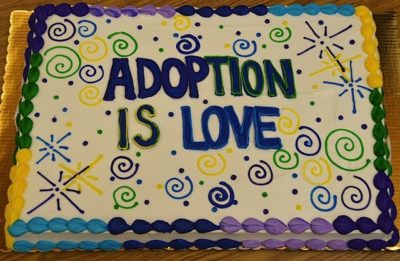All About Adoption
By Guest Blogger Megan E. Spidell, Family Law Attorney & Foster Parent
With the increasing rates of infertility and increasing number of children in foster care in the United States, many couples (and individuals) are considering adoption. Did you know that 10-15% of US couples are affected by infertility? Did you know that more than 57,000 children were adopted in 2020 in the United States? As of the writing of this post, more than 500 children are in foster care placements in Guilford County alone. All of these reasons guided my husband and I on our journey to foster and adopt. But like many people interested in adoption, we had so many unanswered questions.
Who can adopt? Who can be adopted? How long does it take? Can my new spouse adopt my child? Do I need an attorney to adopt? Where do you even start?
These are just some of the questions that you may have lingering in the back of your mind about adoption.
In NC, there are several different types of adoption: i) Minor Children, ii) Stepparent adoptions of minors and 3) adult adoptions. The most common I see, as a family law attorney, are the adoptions of minor children. These can be either from an agency or directly from another individual (like a family member). The second most common that I see are stepparent adoptions. For the purpose of this post, I am focusing on these types of adoption.

So how do adoptions work?
First, an individual must be eligible to adopt.
In NC, you must be at least eighteen (18) years of age. You must (in most cases) submit to a home study, a background check, and fingerprinting. Single individuals and same-sex couples enjoy the same adoption rights as married couples in NC, so long as all requirements are met. For a stepparent to adopt, they must be legally married to the biological parent. The spouse must also consent to the adoption, along with the requirements below.
This list may seem short, but don’t let the home study fool you. If you are going through an agency, this is likely going to include proof of financial stability, physicals, vet records for any pets in the home, DMV records, car registrations, referrals, and lengthy applications about all aspects of your home/family life. Even for me as a family lawyer, this was overwhelming. But it was also worth it.
Second, the adoptee must be eligible for adoption.
This means that either the biological parents i) are deceased, ii) have had their rights terminated, iii) have relinquished their rights or iv) are consenting to the adoption. Even if the biological father is unknown, there still must be a termination of the unknown father’s rights to allow the child to be adopted. If the child is over age 12, they also must give consent to their own adoption. The process is the same whether you are adopting a child directly from another person, from an agency (including DSS), or as a stepparent.
Keep in mind that many children in the custody of DSS have parents who are seeking to reunify. These children are in foster care but may not be eligible for adoption. Many people struggle with the idea of falling in love with a child only to have to return them to a biological parent. However, foster parents serve as the safe place to land for children during the most difficult times in their lives, which can be both difficult and rewarding.
Third, you must file all the documents with the Court.
This includes the adoption petition, copies of birth certificates, marriage licenses, Termination of Parental Rights or Custody Orders from the Court, providing copies of Consents to Adopt or Relinquishments of Rights, and more. Once all the documents are submitted, the adoption will typically take 90 days to process. You will need an attorney or agency to make this go smoothly and ensure your adoption is correct.
Once the adoption is complete, the parents are now the legal parents of the child. The birth certificate is amended to include the new parents’ information and the child’s new name. The adoptive parents now have all legal rights and duties that biological parents previously had. Adoption severs the duty for child support and the right to inherit from the biological parents.
This can be an exciting time for adoptive parents, but this time also represents a loss for a child- the gain of an adoptive parent means the loss of a biological parent. There are many books and resources available to help explain adoption to your child.
Learning about this process helped us make our decision to both foster and adopt. It gave us hope for our future, and the futures of the children we will be welcoming into our homes and hearts.
For more information, click here. For more blogs on Triad Moms on Main about adoption, click here.


Want to see more blogs like this and get notifications on local events and happenings? Subscribe to our free weekly newsletters here.
